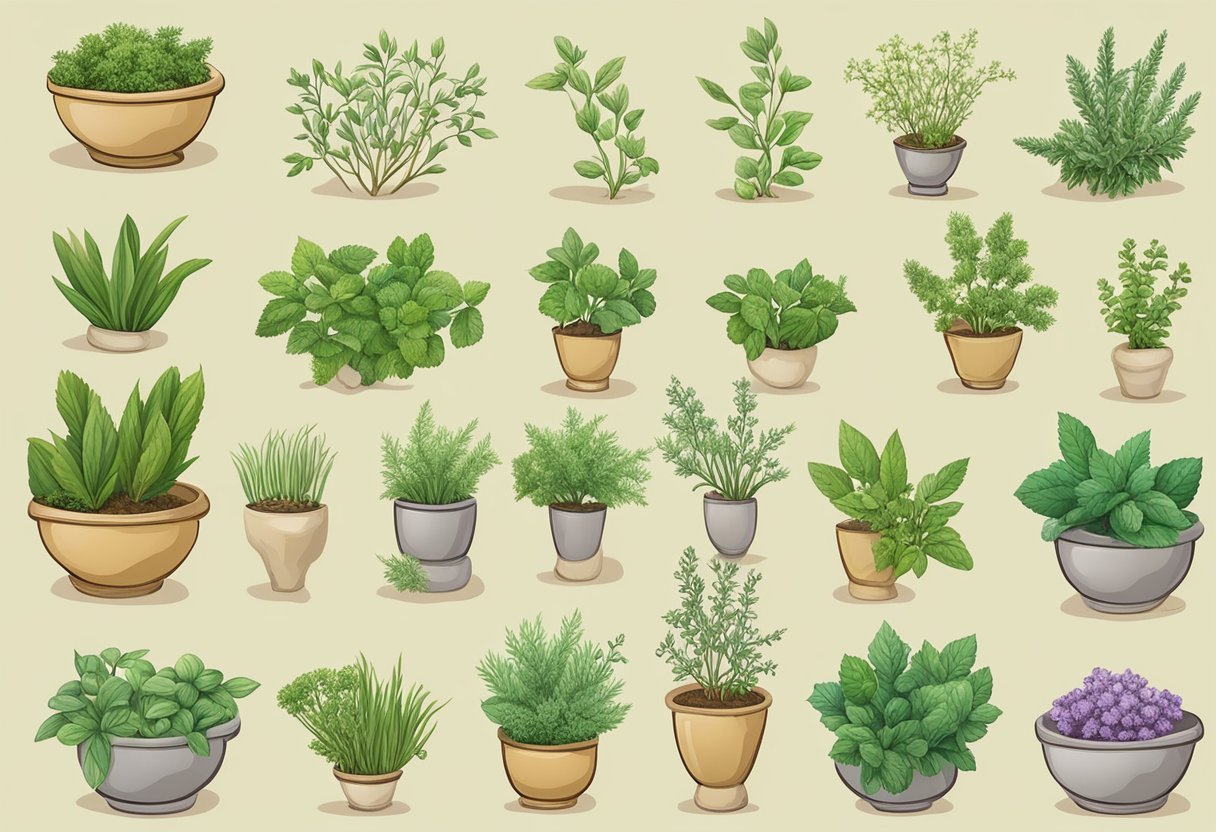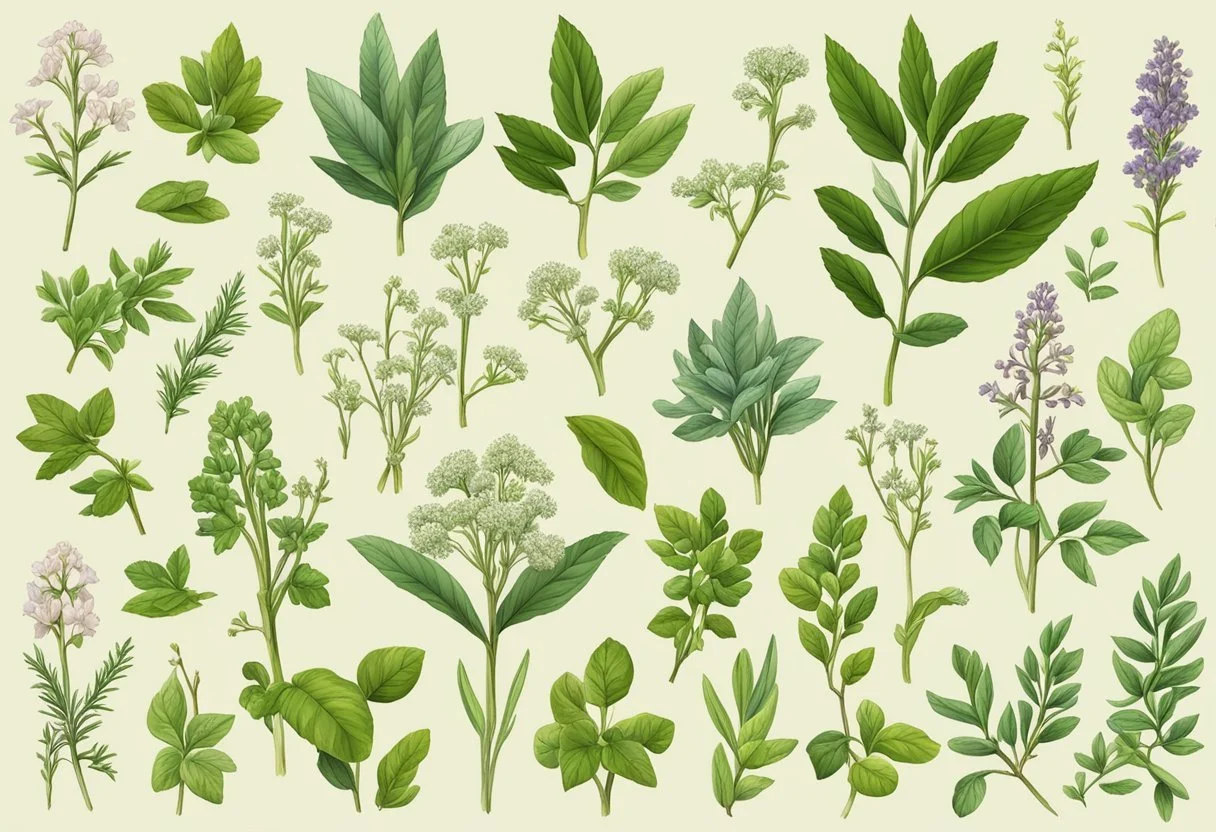What Herbs Are Good for Arthritis?
Top Natural Remedies Explored
This article is part of our series on Natural Health
Discover > Natural Health > What Herbs Are Good for Arthritis?
Arthritis is a common condition that causes pain and inflammation in the joints, affecting millions of people worldwide. Many treatments and medications are available to help manage symptoms, but some individuals prefer to find relief through natural remedies. Herbs have been used for centuries to alleviate various ailments, and they continue to gain popularity as an alternative option for managing arthritis.
Among the many herbs with potential benefits, some stand out for their anti-inflammatory and pain-relieving properties. Utilizing these natural options can provide arthritis sufferers with additional ways to enhance their overall well-being and maintain an active lifestyle. In the following article, we will explore some of the most effective herbs that have been traditionally used and studied for their ability to ease the symptoms of arthritis.
Understanding Arthritis
Arthritis is a common health issue that affects millions of people around the world. It is characterized by inflammation of the joints, leading to pain, stiffness, and restricted mobility. There are over 100 different types of arthritis, but the two most common forms are osteoarthritis and rheumatoid arthritis.
What is Osteoarthritis?
Osteoarthritis (OA) is the most common form of arthritis, affecting millions of individuals worldwide. It occurs when the cartilage that cushions the joints gradually breaks down over time. This degeneration leads to the bones rubbing against each other, causing pain, stiffness, and swelling.
Some factors that may increase the risk of developing osteoarthritis include:
Aging
Joint injuries
Genetics
While there is no cure for osteoarthritis, treatment options are available to help manage symptoms and improve joint function. These may include:
Pain relievers and anti-inflammatory medications
Physical therapy and exercise
Weight management
Assistive devices such as braces or canes
What is Rheumatoid Arthritis?
Rheumatoid arthritis (RA) is an autoimmune disease that causes chronic inflammation in the joints and can affect other tissues and organs. The immune system mistakenly attacks the healthy joint lining, causing inflammation and pain.
Some common symptoms of rheumatoid arthritis include:
The exact cause of rheumatoid arthritis is unknown, but experts believe that a combination of genetic and environmental factors may contribute to the development of this condition.
Treatment options for RA aim to reduce inflammation, relieve pain, and slow the progression of the disease. These may include:
Anti-inflammatory medications and pain relievers
Disease-modifying antirheumatic drugs (DMARDs)
Immunosuppressive medications
Biologic agents
Physical therapy
Both osteoarthritis and rheumatoid arthritis can significantly impact an individual's quality of life. Therefore, early diagnosis and appropriate treatment are essential for managing the symptoms and preventing long-term joint damage.
Common Symptoms of Arthritis
Pain and Stiffness
Arthritis often comes with pain and stiffness in the affected joints. This discomfort can affect daily activities and range from mild to severe. The intensity of the pain may fluctuate over time, with some individuals experiencing periods of increased or decreased pain. In many cases, the pain increases with joint use or during certain weather conditions. Stiffness in the joints is generally more prominent in the morning or after periods of inactivity.
Inflammation and Swelling
Inflammation is a common symptom of arthritis, often accompanied by swelling around the joints. The affected area may become warm, red, and tender to the touch. Inflammatory symptoms can worsen with increased activity or stress on the joint, leading to more discomfort and limited mobility. Swelling, when present with arthritis, is usually a consequence of inflammation, fluid build-up within the joint and surrounding tissue. This swelling can further contribute to the pain and stiffness experienced by individuals with arthritis.
Herbs for Arthritis: An Overview
Arthritis is a common condition that causes joint pain and inflammation. Many people use herbs as an alternative or complementary treatment for arthritis alongside conventional treatments. This section will discuss some popular herbs used to alleviate arthritis symptoms.
Turmeric
Turmeric is a yellow spice commonly used in Indian cuisine. Its active ingredient, curcumin, is known for its anti-inflammatory properties. Research suggests that curcumin can reduce inflammation in joints, which might help relieve arthritis pain.
Ginger
Another popular herb with anti-inflammatory properties is ginger. Ginger contains compounds called gingerols, which could help reduce the inflammation associated with arthritis. Some studies have shown that ginger may be as effective as conventional arthritis medications with fewer side effects.
Boswellia
Boswellia, also known as Indian frankincense, is derived from the Boswellia serrata tree. It contains compounds called boswellic acids, which are believed to have anti-inflammatory properties. Research has shown that Boswellia may help alleviate inflammation and pain in people with arthritis.
Willow Bark
Willow bark is a traditional remedy for inflammation and joint pain. Its active ingredient, salicin, is similar to the main ingredient in aspirin. Some research suggests that willow bark could be helpful in reducing arthritis-related pain and inflammation.
Green Tea
Green tea is known for its numerous health benefits, including its potential to reduce inflammation. It contains antioxidants called polyphenols, which are believed to fight inflammation. Research has shown that green tea may help reduce arthritis symptoms by inhibiting the production of inflammatory compounds.
Aloe Vera
Aloe vera is commonly used for its soothing and healing properties. It is believed that aloe vera contains compounds that can help reduce inflammation, making it a potential treatment for arthritis. Some studies have shown that aloe vera may help alleviate joint pain and inflammation associated with arthritis.
Eucalyptus
Eucalyptus is a popular essential oil with many therapeutic properties. It is believed to have anti-inflammatory and analgesic effects, which could help relieve arthritis pain. Some research suggests that eucalyptus oil may help reduce pain and inflammation in individuals with arthritis when combined with conventional therapies.
Understanding Anti-inflammatory Properties of Herbs
Arthritis is a common joint condition characterized by inflammation, pain, and stiffness. Herbs with anti-inflammatory properties can help reduce inflammation and potentially alleviate the symptoms of arthritis. This section discusses the anti-inflammatory properties of several herbs known for their beneficial effects.
Turmeric contains the chemical compound curcumin, which is known for its potent anti-inflammatory effects. Curcumin functions by inhibiting inflammatory pathways in the body, resulting in reduced inflammation. Turmeric can be added to meals or consumed as a supplement for this purpose.
Ginger is another popular herb with known anti-inflammatory properties. The active components of ginger, known as gingerols, have been shown to block inflammatory pathways and reduce inflammation. Ginger can be incorporated into tea, dishes, or taken as a supplement.
Rosemary carries anti-inflammatory properties through its active ingredient, rosmarinic acid. Rosmarinic acid has been found to suppress inflammatory responses, making it a useful herb in managing arthritis symptoms. Rosemary can be used in cooking or as an oil.
Green tea is packed with antioxidants called polyphenols. Among these polyphenols is a specific group called catechins, which are believed to possess anti-inflammatory properties. Drinking green tea regularly may help reduce inflammation in arthritis patients.
Boswellia is an herb derived from the Boswellia serrata tree gum resin. It contains boswellic acids, which have been found to inhibit enzymes responsible for inflammation. This makes Boswellia an effective herb to help reduce joint inflammation and pain. Boswellia can be taken as a supplement or applied as a topical cream.
To make the most out of these anti-inflammatory herbs, it is important to use them consistently and follow guidelines on dosage. The regular incorporation of these herbs into meals, drinks, or supplements may provide relief from arthritis symptoms and promote overall joint health. It is essential to consult with a healthcare professional before starting any supplement to ensure compatibility and avoid potential side effects.
Health Benefits and Side Effects of Herbs
Herbs can play a significant role in managing arthritis pain and improving overall health. In this section, we will discuss the health benefits and side effects of using herbs, focusing on the importance of diet and nutrition, and the role of exercise and mobility.
Diet and Nutrition
A well-balanced diet is crucial for individuals with arthritis. Including anti-inflammatory herbs in daily meals can help alleviate joint pain and reduce inflammation. Here are some herbs known for their arthritis-fighting properties:
Turmeric: Contains curcumin, which has potent anti-inflammatory effects, and may help reduce joint pain and swelling.
Ginger: Exhibits anti-inflammatory properties and may help ease arthritis pain and stiffness.
Rosemary: Provides relief from joint pain due to its anti-inflammatory and analgesic effects.
However, there may be potential side effects to consider when adding these herbs to your diet:
Turmeric may cause gastrointestinal issues in some individuals.
High doses of ginger may lead to stomach discomfort and worsen heartburn.
Rosemary intake should be limited, as excessive use may induce seizures or allergic reactions.
It is essential to consult a healthcare professional before incorporating herbs into your diet, as they may interact with medications or cause adverse reactions.
Exercise and Mobility
Incorporating physical activity into your daily routine is vital for maintaining joint health and improving arthritis symptoms. Regular exercise can increase mobility, flexibility and help manage a healthy weight. Here are some forms of exercise that can be beneficial for arthritis sufferers:
Aquatic exercises: Helps to reduce joint impact and supports weak muscles.
Stretching: Enhances flexibility and mobility of joints.
Strength training: Builds muscle mass and contributes to overall joint support.
It is crucial to exercise with caution and select activities suitable for your fitness level and arthritis type. Engaging in an intense workout without preparation may cause inflammation, exacerbate joint pain or lead to injury. Consult a healthcare provider or physical therapist to develop an appropriate exercise plan that safely accommodates your arthritis condition.
Always remember that the relationship between herbs, diet, and exercise is complex and requires a personalized approach to achieve the best results in managing arthritis symptoms.
Herbal Supplements and Pills
There are various herbal supplements and pills available in the market that claim to provide relief from arthritis symptoms. These supplements often come from natural sources such as herbs, spices, and botanical extracts, and many people find them useful in managing pain and inflammation. However, it is essential to understand the quality, safety, and effectiveness of these products before using them.
Quality and Safety
Herbal supplements and pills for arthritis should be made from high-quality ingredients and adhere to manufacturing standards. Look for products that have been independently tested for purity and potency by third-party organizations like NSF International or ConsumerLab.
It is crucial to follow the recommended dosage guidelines and consult with a healthcare professional before starting any new supplement regimen, especially if you have existing health conditions or are taking medications. Some herbal supplements and pills can interact with other medications, and certain combinations may not be safe.
Effectiveness
While many individuals report significant benefits from using herbal supplements and pills for arthritis, it is essential to note that their effectiveness may vary from person to person. Scientific data on the efficacy of specific herbal remedies for arthritis is still limited, so outcomes may not be guaranteed.
However, some herbs and supplements have shown promising results in clinical studies and have been widely recognized for their anti-inflammatory and pain-relieving properties. These include:
Turmeric: Contains the active ingredient curcumin, which has been shown to help reduce inflammation in several studies.
Ginger: Exhibits pain-relieving and anti-inflammatory properties, making it a popular choice for managing arthritis symptoms.
Boswellia: Also known as Indian frankincense, this herb may help reduce joint swelling and pain, especially in osteoarthritis patients.
In conclusion, herbal supplements and pills can be an alternative or complementary therapy for arthritis management. However, it is crucial to consider quality and safety while choosing such products, and discuss with a healthcare professional before use.
How to Use Herbal Remedies Safely
Herbal remedies can be beneficial for managing arthritis symptoms. However, it is essential to use them safely to avoid potential side effects or interactions with other medications. The following precautions can help ensure the safe use of herbal remedies for arthritis.
First, consult with a healthcare professional before starting any new herbal treatments. They can provide guidance on which herbs may be beneficial and recommend appropriate dosages. A healthcare professional will also consider any potential interactions with existing medications and make necessary adjustments.
When choosing herbal products, it is important to opt for high-quality and reputable brands. Poor quality or contaminated products could be less effective or even harmful. Look for certifications from third-party organizations that test for quality and safety, such as the United States Pharmacopoeia (USP) or NSF International.
To minimize potential side effects, it is vital to start with a low dosage and gradually increase over time as needed. This approach allows the body to assess its tolerance to the herb without overwhelming the system.
Additionally, it is essential to be aware of possible side effects and to be prepared to discontinue use if adverse reactions occur. Some common side effects of herbal remedies include allergic reactions, gastrointestinal issues, and changes in blood pressure or blood sugar levels.
Lastly, it is crucial to be patient when using herbal remedies for arthritis. The benefits of these natural treatments may not be immediate and may require consistent use over a period of time to see significant results. Always follow the recommended dosage and usage guidelines to ensure the safest and most effective outcomes.
Conclusion
Incorporating various herbs into one's daily routine can provide significant relief for individuals suffering from arthritis. These herbs offer an array of anti-inflammatory and pain-relieving properties, making them a natural and effective alternative to pharmaceutical medications.
Turmeric is a standout herb in combating arthritis due to its active ingredient, curcumin. It has strong anti-inflammatory effects and can also alleviate joint stiffness. Including this herb regularly in one's diet is highly recommended.
Another powerful herb is ginger, which not only helps to reduce inflammation but also has analgesic properties. Consuming ginger in various forms, such as tea or supplements, can potentially provide relief for arthritis symptoms.
Other herbs, like cayenne pepper and green tea, have been found to possess potent anti-inflammatory compounds. Adding these to the diet can be beneficial for those looking to manage arthritis pain and inflammation.
In conclusion, a variety of herbs can be helpful for individuals seeking effective and natural ways to address arthritis. Incorporating these herbs into their daily routines can greatly improve their overall quality of life and provide much-needed relief from arthritis symptoms. It's essential to consult a healthcare professional before starting any new treatment to ensure it's appropriate for one's individual needs.
Natural Health Solutions for Personal Care and Wellness
Natural health practices can provide a range of benefits for personal care and wellness. Birth control pills can deplete essential vitamins like B6, B12, and folic acid. It's important to supplement with these vitamins or eat a diet rich in these nutrients to help support overall health while taking birth control.
Candles can be a source of indoor air pollution, releasing harmful chemicals like benzene and toluene. Choosing natural and organic candles made with beeswax or soy wax can help to reduce exposure to these harmful chemicals and promote a healthier indoor environment.
Spanish needle is an herb commonly used in traditional medicine to promote kidney health and reduce inflammation. Its diuretic properties can help to promote healthy urinary function and reduce water retention.
Slimfast is a meal replacement shake that can help to promote weight loss. While some people may experience increased bowel movements when using Slimfast, this is not a guaranteed effect and can vary from person to person.
By incorporating natural health practices into your daily routine and making healthy choices for personal care and wellness, you can support your overall health and well-being in a sustainable and holistic way. It's important to do your own research and consult with a healthcare professional before using any new remedies or making significant changes to your diet or lifestyle.
#arthritis herb #nonsteroidal anti inflammatory drugs #active rheumatoid arthritis #relieve joint pain related #double blind placebo controlled #herbal medicine #randomized controlled trials







